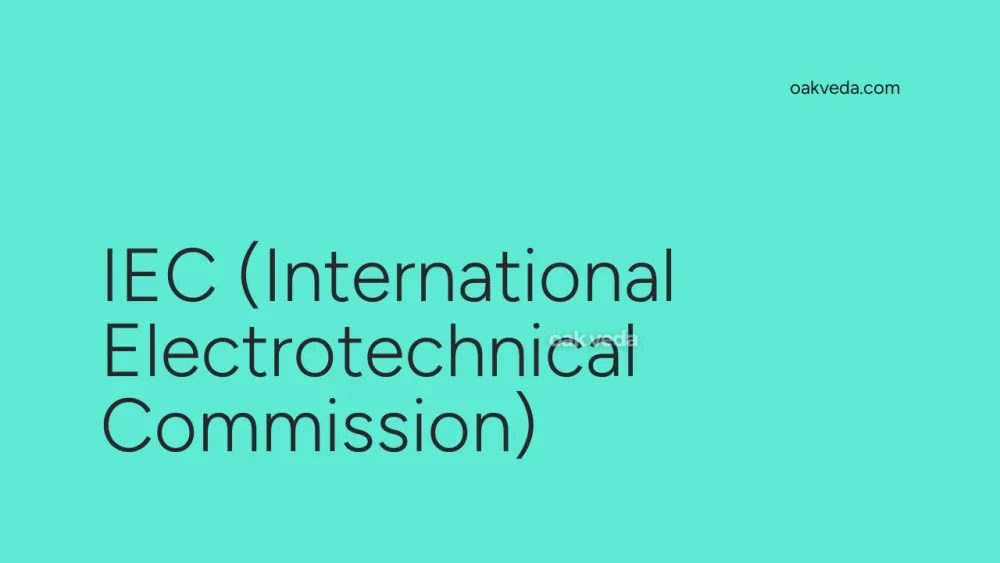
What is the Full Form of IEC?
The full form of IEC is International Electrotechnical Commission. This globally recognized organization plays a crucial role in developing and publishing international standards for electrical, electronic, and related technologies.
What is International Electrotechnical Commission?
The International Electrotechnical Commission (IEC) is a non-profit organization that serves as the world's leading body for the preparation and publication of international standards for all electrical, electronic, and related technologies. Established in 1906, the IEC has been at the forefront of promoting global standardization in the field of electrotechnology for over a century.
Origin and Development of International Electrotechnical Commission
The IEC was founded in London in 1906, following the resolution of the International Electrical Congress held in St. Louis, USA, in 1904. The organization was created to address the need for standardization in the rapidly growing field of electrical technology. Over the years, the IEC has expanded its scope to include electronic and related technologies, adapting to the evolving technological landscape.
How does International Electrotechnical Commission work?
The IEC operates through a system of technical committees and subcommittees, comprising experts from various countries. These committees work collaboratively to develop international standards that are then published as IEC International Standards. The organization follows a consensus-based approach, ensuring that the standards reflect the needs and interests of all stakeholders involved.
Functions of International Electrotechnical Commission
-
Standard Development: The primary function of the IEC is to develop and publish international standards for electrical, electronic, and related technologies.
-
Conformity Assessment: The IEC operates conformity assessment systems to certify that equipment, systems, or components conform to its international standards.
-
Technical Cooperation: The organization facilitates technical cooperation among its member countries and promotes the adoption of IEC standards globally.
-
Market Relevance: The IEC ensures that its standards are market-relevant and address the needs of industry, governments, and consumers.
Applications of International Electrotechnical Commission Standards
IEC standards find applications in numerous areas, including:
- Power generation, transmission, and distribution
- Consumer electronics and home appliances
- Industrial automation and control systems
- Renewable energy technologies
- Information and communication technologies
- Medical devices and healthcare equipment
- Transportation systems, including electric vehicles
Features of International Electrotechnical Commission
- Global Representation: The IEC includes members from over 170 countries, ensuring diverse global input.
- Consensus-Based Approach: Standards are developed through a collaborative process involving experts from various sectors.
- Technological Neutrality: IEC standards are designed to be technology-neutral, promoting innovation and fair competition.
- Regular Updates: Standards are regularly reviewed and updated to keep pace with technological advancements.
- Affiliate Country Program: This initiative helps developing countries participate in IEC activities and adopt international standards.
Benefits of International Electrotechnical Commission
- Global Market Access: IEC standards facilitate international trade by providing a common technical language across borders.
- Safety and Quality Assurance: Adherence to IEC standards ensures product safety and quality.
- Interoperability: IEC standards promote compatibility between different systems and devices.
- Innovation Support: By providing a standardized framework, the IEC encourages technological innovation.
- Environmental Protection: Many IEC standards incorporate environmental considerations, promoting sustainability.
Limitations or Challenges of International Electrotechnical Commission
- Keeping Pace with Technology: The rapid pace of technological advancement can sometimes outpace the standard development process.
- Balancing Global and Local Needs: Striking a balance between global standardization and local requirements can be challenging.
- Implementation Costs: Adopting new standards may involve significant costs for some industries or countries.
- Harmonization with Other Standards: Ensuring harmonization with standards from other organizations can be complex.
Future Developments in International Electrotechnical Commission Technology
The IEC is continuously evolving to address emerging technologies and global challenges. Some areas of focus for future developments include:
- Smart Cities and IoT: Developing standards for interconnected urban systems and Internet of Things devices.
- Artificial Intelligence and Machine Learning: Addressing standardization needs in AI and ML applications in electrotechnology.
- Cybersecurity: Enhancing standards to improve the security of electrical and electronic systems.
- Renewable Energy Integration: Developing standards to support the integration of renewable energy sources into power grids.
- Electric Mobility: Expanding standards for electric vehicles and charging infrastructure.
FAQs on IEC Full Form
-
What does IEC stand for in electronics? IEC stands for International Electrotechnical Commission in the context of electronics and electrical engineering.
-
Is IEC a government organization? No, IEC is not a government organization. It is an independent, non-profit international standards organization.
-
How many countries are members of the IEC? The IEC has members from over 170 countries worldwide.
-
What is the difference between IEC and ISO? While both are international standards organizations, IEC focuses on electrical and electronic technologies, whereas ISO (International Organization for Standardization) covers a broader range of industries and sectors.
-
Are IEC standards mandatory? IEC standards are voluntary, but many countries adopt them as national standards or reference them in regulations, making them effectively mandatory in those jurisdictions.
The International Electrotechnical Commission continues to play a vital role in shaping the global landscape of electrical and electronic technologies. By providing a framework for international standardization, the IEC facilitates technological progress, ensures safety and quality, and promotes global trade in the electrotechnology sector.
You may be interested in:

